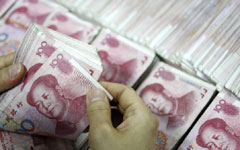There will not be a banking crash, as the authorities still have policy capacity to address the problems and ensure stability
The market is always in search of a story and its corresponding trade idea. Unfortunately, so far this year, the United States, eurozone and Japan have been rather uncooperative on this matter, as their respective central banks and economies have stuck to prior trends. As a result, investors have turned to China in the hope of securing this year's story.
 |
|
 |
However, although the economy may slow further, it is unlikely that the decline in the growth rate will be so large that the government has to usher in a large stimulus package; financial instability exists, but the resources available to the government to ensure stability are still plentiful.
Currently, the bearish predictions of an imminent crisis in China are mostly based on the fact that China's leverage ratio is too high. It is argued that those developing countries that have had a credit boom nearly as big as China's all experienced a credit crisis and a major economic slowdown.
Yes, China's debt-to-GDP ratio is very high, but so are the debt-to-GDP ratios in many successful East Asian economies, such as Singapore, Thailand and Malaysia. The difference is that China's savings rate is much higher than most of them. All other things being equal, the higher the savings rate, the less likely it is that a high debt-to-GDP ratio will trigger a financial crisis. In fact, China's high debt-to-GDP ratio, to a large extent, is a result of China's high savings rate vis-a-vis its equally high investment rate. Certainly, the inability to repay would contribute to the high debt-to-GDP ratio, but so far the nonperforming ratio for China's major banks is still less than 1 percent.
